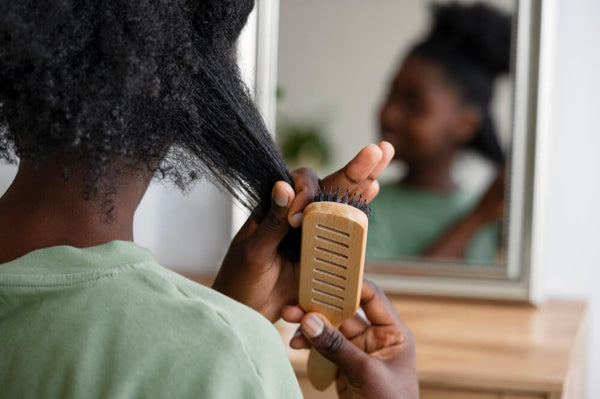Magnesium plays a significant role in over 300 functions within the human body and directly affects your hair growth, follicle production, and the overall growth cycle.
Scalp calcification [Calcium build-up] is a primary culprit in causing disturbances to the hair growth cycle.
It’s usually because of the blood vessels beneath the scalp that accumulates calcium within their walls. These vital vessels turn stiff and can’t support adequate blood circulation to the scalp.
Reduced blood flow to the scalp deprives your hair follicles of the essential nutrients it needs for healthy hair growth.
Calcium deposits may also manifest on the scalp as dandruff, scalp inflammation, and trigger hair loss.
Scalp calcification clog pores, which weaken your hair follicles until they shrink and can’t produce healthy hair.
Magnesium reduces calcium levels at the scalp level without disrupting its flow to other areas of the body.
It improves scalp circulation and ensures that those vital nutrients your hair needs are available to flow into the region and stimulate your hair follicles.
Magnesium Aids Protein Synthesis
Magnesium helps keep your hair healthy due to its role in protein synthesis. Protein synthesis is responsible for melanin and supporting the hair growth cycle.
Without magnesium, protein synthesis is lost and causes problems for the hair structure and growth process.
How Magnesium Deficiency Contributes to Hair Loss
Can magnesium deficiency cause hair loss? The short answer is…' yes.' Many factors lead to magnesium symptoms, including:
- Type 2 Diabetes
- Pregnancy or Breastfeeding
- GI disorders like celiac disease or Crohn’s disease
- Excess loss of magnesium due to sweating or increased urination
- Medications like diuretics and antibiotics
- Age – older adults are more susceptible
Nutritional deficiencies can also contribute to magnesium deficiency. It’s quite common for people with magnesium deficiency to experience;
- Nausea and vomiting
- Loss of appetite
- Moodiness
- Muscle cramps
- Weakness.
Low magnesium may cause various problems for our bodies like;
- Bone density issues
- Gastro problems
- Nerve and muscle function issues
- Premature hair graying
- Hair loss.
It’s natural to overlook the effects your dietary decisions have on your hair. When you don’t consume the right balance of healthy nutrients, conditions like Vitamin D deficiency, potassium deficiency, iron deficiency, and magnesium deficiency can emerge.
However, it could take several months before you notice hair-fall due to nutritional deficiency.
Magnesium Supplements And Diet
There are steps you can take to reverse or prevent magnesium deficiency.
Our Nina Ross Potassium & Magnesium supplements increase magnesium levels for hair regrowth.
Plus, you can make changes to your diet and improve your magnesium intake by consuming magnesium-rich foods.
Ideal food sources for magnesium are:
- Avocados
- Dark chocolate
- Seeds and nuts
- Tofu
- Beans
- Fatty fish
- Bananas
- Leafy greens
Other steps you can take to manage magnesium deficiency would be ensuring you have all underlying conditions under control and addressing other dietary deficiencies that may cause your hair loss.
For example, you’ll need to check if you’ve got Vitamin D deficiency and how you can improve on this condition.
Vitamin D deficiency can affect how well your body absorbs magnesium.
Final Thoughts
Finally, if you’re experiencing low magnesium and hair loss, you can reverse the effects by integrating magnesium supplements into your daily routine.
The combination of magnesium supplements like our Nina Ross Potassium & Magnesium supplements and magnesium-rich foods go a long way to reverse the effects of this nutritional deficiency.
Make sure that you address other underlying conditions or nutritional deficiencies that you might be experiencing as they hinder the absorption of magnesium.
Need to identify what’s causing your hair problems? We’re here to help your hair and scalp get better.
Book a consultation right away.















